So, you had a kidney stone and were given some information about a low oxalate diet. Or, you did your research and you found some information online about oxalate and kidney stones. But, what the heck does a “low oxalate diet” even mean? And, why is that important?
Table of Contents
What Is Oxalate?
Firstly, what is oxalate itself? Oxalate is something called a “non-nutrient”. Basically, it is a compound found in many (healthy!) foods that doesn’t provide our bodies something they need. Compare this with a “nutrient” (such as potassium, calcium or a vitamin), which does something good for our body.
Oxalate is primarily found in plant foods. Vegetables, fruits, beans, nuts, seeds and whole grains are most known for having high oxalate levels. Of course, some plant foods have more oxalate in them than others. Oxalate tends to be in very healthy foods!
Oxalate and Kidney Stones
Oxalate is probably most known for it’s role in kidney stones. This makes sense, as about 80% of kidney stones are made of calcium and oxalate. (1)
Calcium oxalate kidney stones are more likely to form with the conditions in your urine are just right. Calcium and oxalate love to bind when:
- There is a lot of calcium in your urine
- There is a lot of oxalate in your urine
- Your urine is very concentrated (aka – you don’t drink enough water!)
- There is too much acid in your urine (pH is too low)
- There is not enough citrate in your urine
Nutrition can play an important role in preventing calcium oxalate kidney stones by modifying each of these urine risk factors.
Beyond Calcium Oxalate Kidney Stones
Although a majority of kidney stones are made from calcium and oxalate, there are many kinds of kidney stones. Most notably, calcium phosphate and uric acid kidney stones are common. (1)
If you have had kidney stones that are NOT calcium oxalate, chances are you do not need to avoid how much oxalate you eat. Avoiding oxalate will not reduce your risk of kidney stones in this case.
This is why it is so important to have your kidney stones analyzed. The type of kidney stone you make should dictate treatment, including the kind of diet you follow for prevention.
If you were not able to have your kidney stone analyzed, a 24-hour urine test will help you and your doctor understand what kind of kidney stone you are prone to making. And, how high your risk is for forming another stone. A 24-hour urine test will measure how much oxalate is in your urine, which will also help you determine if you need to cut back how much oxalate you eat.
Does a Low Oxalate Diet Reduce Calcium Oxalate Kidney Stones?
Surprisingly, no published studies have shown a reduced risk of kidney stones by reduced dietary oxalate. Although we do know that eating more oxalate increases the amount of oxalate in your urine, this only accounts of 30-50% of the variation in urine oxalate.(2) And, many other factors play into kidney stone risk including urine calcium, pH and citrate.
In fact, the DASH diet has been well documented to both reduce the risk of kidney stones and kidney stone risk factors. (3)(4)(5)(6) The DASH diet includes 9-10 servings of fruits and vegetables per day and encourages nuts and seeds – making it fairly high in oxalate. Despite this, people who follow dietary patterns similar to the DASH diet are less likely to have kidney stones. This is likely because the DASH diet impacts many other beneficial kidney stone risk factors such as urine pH, citrate and dairy.
In fact, a low oxalate diet could make kidney stones worse in some ways.
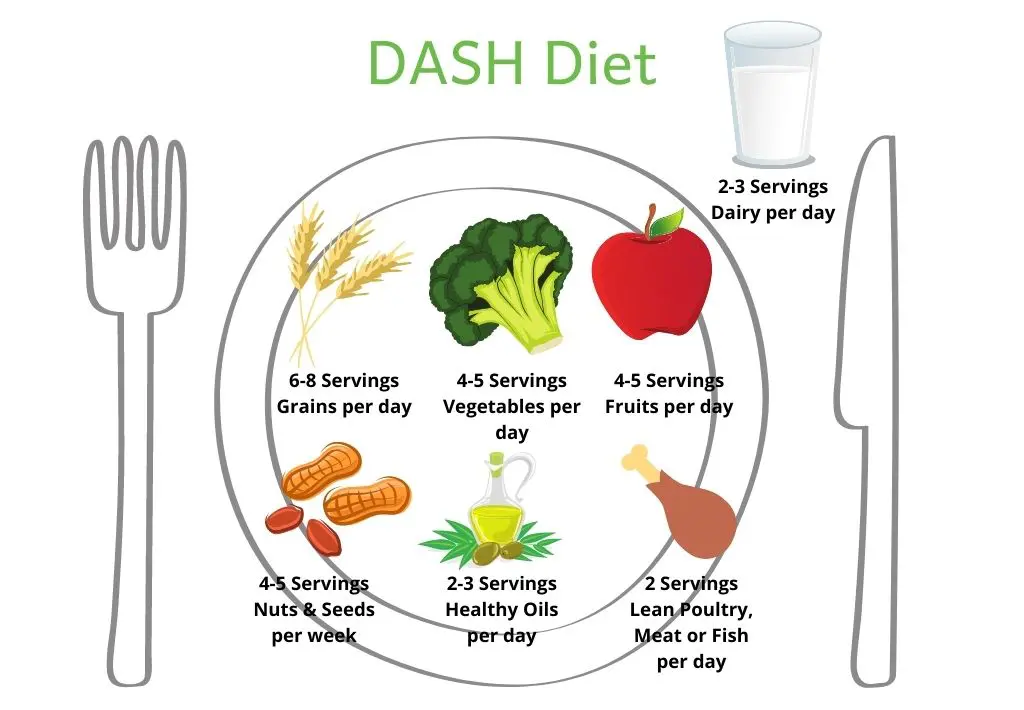
This is not to say that we should throw oxalate out the window. Some people do have very high levels of urine oxalate and avoiding high oxalate foods can reduce their kidney stone risk. But, a low oxalate diet is NOT necessary for everyone with kidney stones.
So, what is a person with kidney stones to do!? The answer lies in kidney stone urine risk factors. Not everyone, even everyone with the same type of kidney stone, has the same urine risk factors.
Individualized Healthy Eating for Kidney Stones: Much More Than a Low Oxalate Diet
To be as effective as possible, healthy eating for kidney stones must be individualized to urine risk factors. Here is a list of common urine kidney stone risk factors. Each of these can be identified with a 24-hour urine test:
- High urine calcium
- High or low urine pH
- Low urine citrate
- Low urine volume
- High urine oxalate
Each of these urine risk factors can be targeted with specific dietary change.
Interestingly, the most common urine risk factor for kidney stones is high urine calcium. Too much salt, protein and added sugar can contribute to high urine calcium.
If you do not have high urine oxalate, then you do not need to follow a low oxalate diet. Instead, you should focus on your urine risk factors for kidney stones.
Inaccurate Kidney Stone Nutrition Info is Rampant
Unfortunately, generic “kidney stone diet” education materials are often given to everyone with kidney stones, no matter what kind of kidney stone they have. Or, what their specific urine risk factors are. In fact, a 2018 study found that information given to people with kidney stones in the Emergency Room may be a common source of misinformation.(7) It is important to follow-up with your doctor and do a 24-hour urine test to understand what healthy eating for kidney stones should be for you.
I help people approach make personalized changes to their diet for kidney stone prevention in Kidney Stone Nutrition School.
How to Lower Urine Oxalate
If you do have high urine oxalate, then nutrition can play a very important role in lowering it. But, how much oxalate you eat is only part of the puzzle. Here are 3 steps to lower how much oxalate is in your urine.
Step 1: Get Enough Calcium
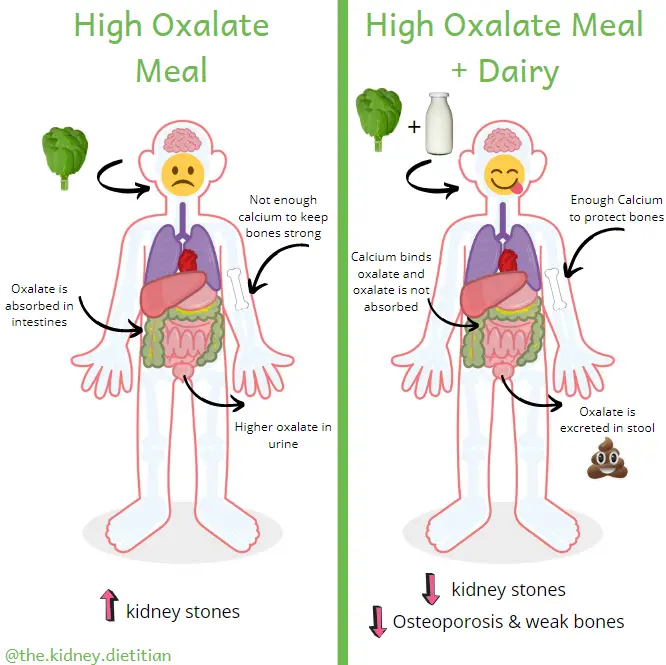
For most people, eating enough calcium is the most important thing you can do to bring urine oxalate down to healthy levels.
Calcium and oxalate love to bind with each other. If you eat calcium-rich foods with your meals, calcium will bind with oxalate in your intestine, stopping the oxalate from getting absorbed.
Research has shown that eating enough calcium is more effective at lowering urine oxalate than a low oxalate diet.(8)
For most adults, a goal of 1,000 – 1,200mg of calcium per day is ideal to prevent kidney stones. This is the same amount of calcium that is recommended to the general population.(9)
Eating 3 servings of dairy per day will nearly guarantee that you meet this calcium goal.
More about the best sources of calcium for kidney stones.
Step 2: Eat the Right Amount of Protein
Our liver can make oxalate from protein. So, eating too much protein can increase how much oxalate your liver makes, causing an increase in urine oxalate.(10)
Protein needs are different for everyone. But, a goal of about 0.8 grams of protein per kilogram body weight is a good place to start. This is plenty of protein for most people and is the recommended amount for healthy adults in the United States.(11)
For most of us, meat, chicken, fish and seafood are the main source of protein in our diets. Focus on limiting portion sizes of these foods to 3-6oz. And, limiting these foods to no more than 1-2 meals per day.
More about protein and kidney stones.
Step 3: Reduce How Much Oxalate You Eat
The last step to lowering urine oxalate is cutting back how much oxalate you eat. The good news is that many people can bring their urine oxalate levels down to a safe range by avoiding only the very high high oxalate foods and making sure to get enough calcium.
The very high oxalate foods are:
- Spinach
- Beets
- Almonds (and almond products such as almond milk, flour and butter)
- Navy Beans
- Rhubarb
- Miso
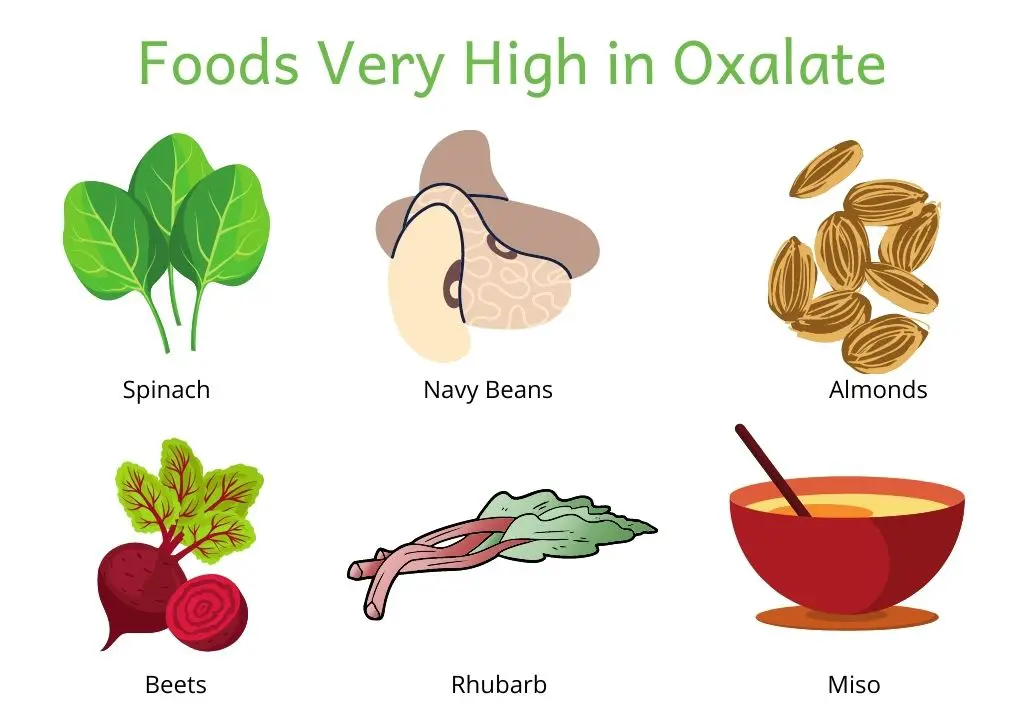
If your urine oxalate levels are still high after avoiding these foods and getting in your calcium, I recommend taking stock of your diet and identifying other higher sources of oxalate you might over eating. I do NOT advocate an “all or nothing” approach. If you focus on avoiding oxalate as much as possible, you will likely limit otherwise very healthy foods, making it difficult to give your body the fiber, fruit, vegetable and other nutrients it needs. This can increase risk of other health conditions like heart disease, cancer, diabetes and even cognitive decline.
Here is a list of many foods and their oxalate amount.
Chances are, you can absolutely enjoy your favorite foods even if they are on the higher oxalate side. Just be mindful of portions. For example, whole grain bread is notorious for being high in oxalate. However, one slice only has around 6mg of oxalate. When you think about a “low oxalate” diet as simply limiting those foods that are very high in oxalate, that slice of whole grain bread seems quite reasonable! More about my thoughts on whole grains for kidney stones.
Incorrect Oxalate Food Lists
You might notice that this high oxalate food list contradicts others you’ve found online. Or, even lists that your doctor gave you. Unfortunately, there is a ton of incorrect information out there when it comes to high vs. low oxalate foods. Oxalate is notoriously difficult to measure, and many of the food studies measured it incorrectly in the past. In addition, one person’s definition of a “high” oxalate food may be different than someone else’s definition.
I recommend using the Harvard Oxalate Food List, as we know the way oxalate was measured for this list was accurate. I also find it useful to stick with one list to avoid the frustration and confusion of trying to piece together other lists with conflicting information.
Low Oxalate Diet and Chronic Kidney Disease
There is some interesting research examining the role oxalate may have in kidney disease. In some cases, high urine oxalate has been linked to increased inflammation and faster progression of kidney disease. (12) In addition, “juicing” and “cleanses” that recommend extremely high amounts of high oxalate foods have been found to cause nephropathy. (13) (14)
However, not all bodies handle oxalate the same way. Some people absorb a lot of oxalate from their food, whereas others do not. Remember that diet oxalate may not even be the biggest contributor to urine oxalate. Oxalate make in the liver can be a big contributor to total body oxalate.
Because oxalate is in so many foods that we know are good for kidney disease, I do not recommend that everyone with kidney disease avoid oxalate. We know that vegetarian diets high in very high oxalate foods such as beans, nuts, seeds, lentils and vegetables can slow the progression of kidney disease.(15)
However, if a 24-hour urine test shows high levels of oxalate in your urine, it may make sense to reduce how much oxalate you eat. Work with your doctor or dietitian to figure out what is best for you!
Oxalate and Polycystic Kidney Disease
People who have Polycystic Kidney Disease (PKD) are at high risk of kidney stones.(14) And, in animal models, calcium oxalate crystals have been shown to be harmful in PKD.(16)
However, even among people who have PKD, there are differences in how much oxalate gets absorbed. The best way to know what is best for you is to get a 24-hour urine test. This will assess how much oxalate is in your urine. If urine oxalate is high, working on getting in enough calcium, avoiding large amounts of protein and reducing how much oxalate you eat may help reduce risk of kidney stones and progression of PKD.
But, unless you have high levels of urine oxalate, I do not recommend that people with PKD avoid high oxalate foods.
Other Low Oxalate Diet Conditions
There are claims that a low oxalate diet helps with many different conditions. However, there has been very little research to determine if changing how much oxalate you eat impacts any of these conditions. Therefore, I cannot recommend a low oxalate diet for any of these conditions. In fact, unnecessarily avoiding oxalate could result in a diet pattern that is less healthy and lacking in important nutrients, exacerbating some of these conditions.
- Vulvodynia (17)
- Interstitial Cystitis
- Fibromyalgia
- Inflammatory Bowel Disease
- Cystic Fibrosis
- Arthritis and joint pain
- Autism
- Fatigue
- Other Autoimmune Conditions
- Other Inflammatory Conditions
As always, work with a Registered Dietitian who knows your medical history to figure out what is best for you! Ideally, find a dietitian well versed in kidney stone nutrition. I help people prevent kidney stones with a personalized approach every day in Kidney Stone Nutrition School!
Happy Eating!
Melanie

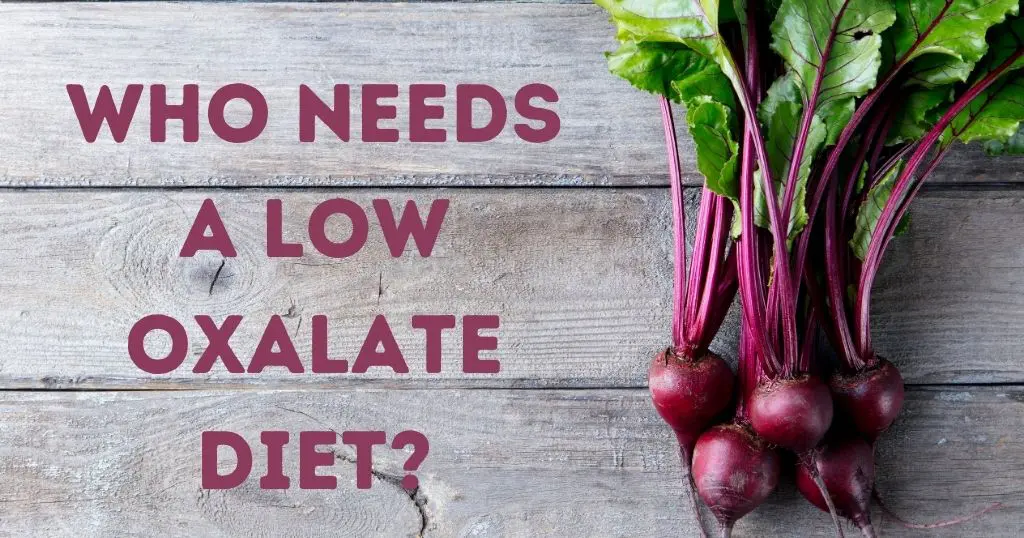
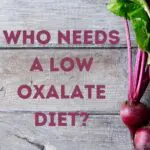
In a previous question I asked, you thought I didn’t need to go on a low oxalate diet.
I have calcium oxalate crystals but with no number attached on my lab results. My doctor told me just to increase my water intake, I have been doing that for the last two weeks. I am still having symptoms. My question is if I don’t go on a low oxalate diet, what do you suggest I do? I am scared of actually getting kidney stones or worse if I go back to eating normal without doing an overload of animal protein and spinach of course. My downfall is all kinds of potatoes, avocado, pistachios, ezekiel bread, and cinnamon in my oatmeal. I know you mentioned that pistachios aren’t high, but I have seen several lists that say they are, so confused. Also, can I just have calcium throughout the day or does it have to be with the food?
I’d recommend getting a 24 hour urine test to understand WHY you are making those crystals. It may or may not be due to high urine oxalate.
Hello Melanie my name is Aida I got rid of my kidney stone thank you.Wants my problem is now I have cyst in my Kidney i’m trying to see a doctor they have me in a waiting list. It’s not that bad I just Gotta be careful in what I eat and try to lose some weight my weight is 196 I would love to go down to 160 but I’ll be happy with 170 I would love to hear from you and maybe you could help me in what to eat and what to avoid thank you so much.
Hi Aida. Great news on your kidney stone! I don’t work with people individually outside of Kidney Stone Nutrition School. This list of other kidney dietitians will help you!
Hi Melanie,
I have been found multicalcifications in both kidneys after a Computerized Axial Tomography. No stones of any size but as I say, multiple calcifications. Even though you minimise the risk of an oxalate rich diet to cause kidney stones, I believe that in my case, given that I drink a lot of liquids and have no family history of kidney stones, that my diet may have caused this. I have been eating almost daily large amount of oxalates in the form of toasted peanuts (as much as 150 grams daily) plus other oxalate rich foods, for months and probably 2 iitres of skimmed milk plus 4-5 yogurts every day. Do you believe that too many oxalates and probably 2.500 plus miligrams of calcium could be the culprits? I know that calcium is good but is too much calcium bad of kidney stones? Also, I never mix peanuts with milk as I have them at different times during the day… so they do not mix in the gut.
Thanks for the very informative website!!
Hello! I’m so glad you’ve found my site helpful. It is certainly possible diet has contributed to your calcifications. Even though you haven’t had “stones” exactly, that 24 hour urine test would still be helpful in understanding what you can do to stop your situation from getting worse.
Have anyone lost weight due to Kidney Stones? I’m sure I also lost weight, due to Hyperactive Thyroids, which I’ve gotten in control. It came back, and dealing with both.
I’ve worked with MANY people who have lost weight not because of kidney stones directly (stones themselves will not cause weight loss), but because they are so afraid to eat they are losing a dangerous amount of weight. In your case, it is likely that thyroid issue that is causing both the weight loss and kidney stones.
Holy cow ! Thanks so much I see that there is more to the subject of kidney stones than one realizes. The wrong info is worse than none. we must educate ourselves Liz
So true!! SO much of the information online about stones is just plain wrong, or doesn’t apply to you! I’m glad you found me!
I lowered my oxalates and decreased calcium foods to about 700mg and the calcium level in urine 24 hr test 295 still.
We actually want to get ENOUGH calcium to help lower urine oxalate. 700mg of calcium isn’t enough for most people! Learn more about calcium here!
My mother have kidney stone and she have pain.
I’m so sorry to hear that. I’m sure you’ll find a ton of useful information on my site to help her!
What if I have both high urine calcium and oxalate? I also have osteoporosis.
My doctors and nutritionist are telling me conflicting things. HELP!!!
This is incredibly common! High urine calcium DOES NOT mean you need to restrict how much calcium you eat (contradictory, I know!). This article will help explain. I’d also love to help you know exactly what you should eat for kidney stone prevention (which, coincidentally is VERY similar to changes for osteoporosis!). I do this everyday in Kidney Stone Nutrition School!
What if I am vegan, but do have occasional salmon once in a while. I was going to get canned salmon with bones, but that is has a lot of salt. Also, I stopped eating tofu, beans & grains, since those are high in oxylates, but that was how I was getting my complete protein. Very confused food-wise. Thanks so much!
This are exactly the type of questions we talk about in Kidney Stone Nutrition School. I’d love to help you figure out what you SHOULD be eating!
You should not worry about the salt, it’s the sugar that is doing the damage, our bodies need a certain amount of salt as it’s essential for health. I would not avoid salmon because of the salt. https://youtu.be/3f8VAK-K1A0
Hi! Thanks for this information. I am finding this kidney stone journey especially challenging as a young female. Any helpful information on kidney stone formation and PCOS (commonly understood as diabetes of the ovaries)? I understand those diagnosed with diabetes have a much higher risk of stone formation. As someone who was just diagnosed with PCOS and has family members with diabetes on both sides I wonder if there is a correlation. I was given the whole, low oxalate, low sodium, high water shpeal even though my 24 hour urine was high in calcium not oxalate and I drink 120 ounces of water a day and eat very well and take care of my body. This journey is so challenging!
Hi Lauren! You are so welcome! The connection between PCOS and stones is VERY misunderstood. It does seem to have some connection, but there are very limited articles written on this topic. Ultimately, if you have stones, PCOS or not, we just need to make changes based on those urine test results. If your oxalate wasn’t high, reducing oxalate intake likely isn’t going to help prevent stones for YOU. That high urine calcium is actually MUCH more common than high oxalate – so that makes sense! There are other dietary changes you can make to help lower urine calcium. I totally hear you about this journey being challenging – especially when you start trying to mix recommendations for stones and other health conditions. I know there are a gazillion things online about “diets” good for PCOS – most of which are truly not backed by a lick of research. Helping people navigate these murky waters is exactly why I created this site and my course, Kidney Stone Nutrition School! Please let me know if there is every anything I can do to help you!
Congratulations on having your brand new beautiful baby! I am brand new to your website and am looking forward to learning how to live with a low oxalate diet. I’ve not had kidney stones but have experienced a lot of pain in my body due to eating a high oxalate diet and not drinking enough water. I’m ready to make a change. I will be seeing a holistic doctor next week and will ask for a 24 hour urine test to see what exactly is going on. I was praying that God would lead me to the correct information on this topic and l found you pretty much right away. I love in southern Cal also. Do you have books, cookbooks or seminars? Thank you so much, this topic is very overwhelming. May God bless you and your family.
Hi Dana. Welcome to my site! A 24-hour urine test is definitely the best way to know if you need that low oxalate diet. The VAST majority of people do not need to worry about oxalate – in fact, a low oxalate diet tends to be less healthful! I do have some cookbooks and a course all about kidney stones and walking people through those 24-hour urine test results – you can learn more here!
Thanks for this site Melanie, and all of the replies 🙂 Developed a 1cmkidney stone at age 60. Then same at age 63 same kidney. Never had a problem before. Changed diet in between stones. now I come to your site and I am enlightened!!
thank you very much
I just had my 6th cystoscopy/laser lithotripsy. This was the first time in the 27 years since my first stone has ever informed me of the low oxylate diet. I was really depressed to see that all the healthy foods I eat most were the ones I could no longer have-until I stumbled upon your page. You are an absolute lifesaver! From one foodie to another, thank you from the bottom of my heart.
You are so welcome, Sara! There is SO SO much more to kidney stone prevention than oxalate. Oxalate is usually the LEAST of my worries. Please do let me know if ever want my help learning more about what you can do that actually matters for stone prevention!
I’ve heard that if person has had a gastric bypass they are more prone to kidney stones. Do you have any information on that possibility.
This is definitely true! The most malabsorptive surgeries actually result in about a 4x increased risk of stones. I have an entire post about it here. I hope that helps!
Thank you for sharing such great information! I’m so grateful to have found your website.
I have recently been diagnosed with Stage 4 CKD secondary to oxalate crystals in my kidney ( crystal nephropathy?). I’m wondering how this all applies to this specific diagnosis. My doctor had me following 50mg oxalate/day as well as low protein, sodium and sugar. Also 2-3 servings of dairy daily.
Hi Christie! You are so welcome, I’m happy you’ve stumbled across me in the internet! And wonderful question. I would assume that your urine oxalate is high with that diagnosis, but I would still think it would be worth checking with a 24 hour urine test. Those oxalate crystals are likely made from calcium + oxalate – and there are certain things you can do to help get that urine calcium down (it sounds like your doctor has you doing many of them such a low sodium and low protein – which is also a good idea with CKD stage 4!). You likely have very specific and individualized needs with both of those diagnoses!
Hi Melanie,
Thank you so much for your posts on the Oxalate Food List. I have been agonizing over my new diet. I was just diagnosed with calcium oxalate kidney stones after my outpatient surgery to remove a fairly large stone. I had been eating great amounts of nuts, drinking lots of caffeine, and consuming many soy products for quite a few years. I enjoyed eating out a lot. I am very determined now to start cooking at home, learning what foods are safe for this condition, and am inspired with your research and positivity. Perhaps I could mention your website to my Dr’s office. Thank you for giving us hope and guiding us through this process.
Hello Zena! Thank you so much for your comment. I’m so happy to hear you are motivated to make changes for stone prevention and found me! Make sure to check out this article (if you haven’t already), which is more of a comprehensive approach to calcium oxalate stone prevention!
I would absolutely love for you to share my site with your doctor’s office. My goal is to help as many people as possible, so however we can get the word out there is amazing! I’m happy to connect with them directly if they want to learn more about me as well!
Thanks again for another highly informative article! I’ve heard that collagen and gelatin can turn into oxalates in the body. Should these be limited by those prone to kidney stones?
Hi David. Technically any protein can turn into oxalate. So, gelatin and collagen would fall into this category. I don’t think you need to necessarily restrict these particular proteins. Instead, we usually focus on limiting total amount of protein in the diet if someone has low urine pH or high urine calcium or oxalate. Hope that helps!
Any thoughts on the link between oxalates and thyroid disorders?
Hi Peter! Although oxalate crystals can accumulate in the thyroid, there is no research to show that reducing the amount of oxalate in your diet can help prevent or treat any type of thyroid disease. The amount of oxalate in your body is dependent on MANY factors, and dietary oxalate actually generally plays a small role, for most people. Hope that helps!
thank you! I’m so glad you recognized how many different sources contradict each other for low oxalate foods. it’s been very frustrating.
I’m also having a hard time finding high calcium foods in the low oxalate list other than dairy? would love any guidance. thank you again.
Hi Sandra! Thank you for your comment! Dairy does tend to be the best source for calcium. But, there are a few other options! I wrote this article all about this!
Will a 24 Hour StoneRisk Diagnostic Profile test tell me what kind of stones I have? My doctor said he was unsure because we did not have the stones analysed, but he put me on potassium citrate and told me to drink lemon & lime juices.
Hi Sharon! Although a 24 hour urine doesn’t technically tell you what kind of stones you made, it will give you and your doctor a VERY good guess as to what kind they were. And (perhaps more importantly), tell you what kind of stone you are at risk of forming in the future. Potassium citrate and lemon/lime juice will only be helpful if you have low urine citrate, so I’d definitely push for that test if you can!
Hi Melanie,
Thanks for the very informative post.I did not even notice typos mentioned by Beverly as I was grateful for gaining new information on this topic. Content matters more than scrutinizing typos by the way Beverly. Keep up the good work Melanie.
Thank you so much Nomtha! I’m SO glad that you’ve found my article helpful. I think I went through and found the typos in this post – what can I say, I am human! 🙂
Hi Melanie, could you share information about the oxalate content in the new plant based/meat substitute foods (e.g., Beyond Meat, Impossible Burger, etc.).
Many thanks,
Bob
Hi Bob! That is a great question. As far as I know, those products haven’t been analyzed and it is impossible to know a precise oxalate amount. I recommend looking at the ingredients (especially those listed first, as ingredients are listed in the amount they are used – highest to lowest) and making sure there is nothing very high in oxalate – if you do need a low oxalate diet of course!
There are quite a few typos in your article. But very informative overall.
Hi Beverly- thank you for your comment! I’m glad you found the article informative. Hopefully I’ve fixed all the typos now 🙂 Happy New Year!